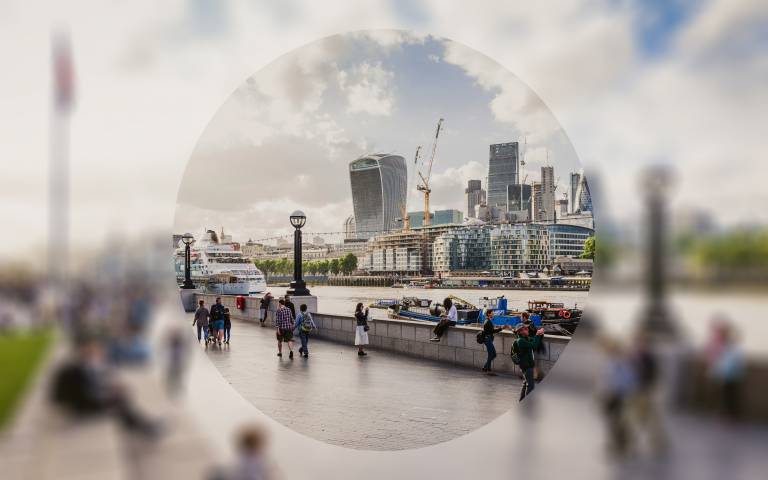Societal uncertainties and the UK energy transition
21 June 2021

At a glance
- The UK has put into law its commitment to reduce its greenhouse gas emissions to net zero by 2050, in order to play its part in reducing climate change.
- This requires a transformation of the energy system (‘the energy transition’).
- Such a transformation has important societal and behavioural implications, which will need to be understood and addressed if the transformation is to be achieved.
- Such understanding can only arise through deep engagement with all stakeholders and citizens, to reveal the many societal interconnections in the energy system, and hence inform resilient and efficient policy-making
- The UK Citizens’ Climate Assembly was a good example of such a new approach to policy making in action.
What is the problem?
In order to avoid greatly increased impacts on human societies and the natural world caused by heating of the climate, human emissions of greenhouse gases (GHGs) will need to be reduced nearly to zero over the next three decades. In June 2019, the UK committed to become “net-zero carbon” by 2050, and some other major economies have since done the same. To achieve this, the whole energy system needs to be transformed. Fossil fuels must largely be phased out, whether they produce electricity or are directly consumed in energy services like transport and heating. Electricity produced with low-carbon technologies will need to meet a large part of societies’ needs for heating and transport, as well as for cooling and appliances, as at present.
These changes in energy systems will both reflect and be driven by changes in consumer and wider societal behaviours and attitudes, which will themselves be stimulated by public policy. In order to know what policies to implement and the effects they will have, policy makers will need to gain new insights into the attitudes and preferences of people, and how they are changing, as both voters for the necessary policies, and consumers of low-carbon technologies and services. However, such changes in societal behaviours, and their environmental effects, are notoriously difficult to forecast and quantify. What is certain is that achieving the climate targets will require new policies, and they will have to be bold: the UK is significantly off-track to reach both the 68% emissions reduction (from 1990’s level) by 2030, which Boris Johnson pledged in December 2020, and the 78% reduction by 2035 which he put into law a few months later.
What are the key characteristics of the problem?
How people use energy is deeply influenced by the technologies available to them, and the way the energy system is organised. If the energy system is to change, to become decarbonised, people’s energy-using behaviours will need to change too, and they will need to feel comfortable with these changes if they are to support them. Covid-19 has shown that most people are prepared to change their behaviours when they perceive the need. The changes required by the phasing out of fossil fuels in favour of low- or zero-carbon energy sources are quite different, but in their way no less profound, and they will need to evolve over decades. This transition to net-zero GHG emissions is made more complex by the fact that many of the required changes, and which new technologies will be deployed for what purposes, are still highly uncertain.
Climate change continues to be a difficult topic to understand. Many people do not exactly know in which way their behaviour is contributing to climate change, they may not feel empowered to make changes, or they simply cannot afford to make low-carbon choices, if these are more expensive. As the frequency of extreme weather-related events increases, both globally and in our own local areas (for example, heat waves, droughts, floods), it is likely that general awareness of climate change, and a willingness to change lifestyles in response to it, will increase. A recent UN Global Climate Poll suggest that as many as 81% of the UK population agrees that climate change is a global emergency. Similarly, the BEIS (Department for Business, Energy and Industrial Strategy) Public Attitude Tracker published in May shows that 70% of the UK public think that climate change is affecting people in the UK as a whole, at least to “some extent”. The global ‘climate strikes’ in 2019 also showed that some people think that current policies are far from sufficient, and would support much bolder actions from policy makers, to make it easier for them to change their own lives.
The changes in behaviour in response to the pandemic are ambiguous. Some have been pro-environmental (interest in protecting the quality of one’s local environment, an impulse for greener cities, a temporary cut in carbon emissions), others not (a surge in the use of private transport, seen as the safest option, and in single-use plastics and littering). Some post-pandemic societal changes might turn into long-term trends, for example online shopping (with increased delivery emissions), virtual meetings and entertainment, more household heating as people work from home. As office-based work becomes more flexible, a different distribution of consumption and emissions may emerge (e.g. commuting transport to and from urban and rural areas). However, the International Energy Agency (IEA) has warned that, unless the pro-environmental societal changes are sustained, emissions from fossil fuels as economies open up will rebound significantly in most countries in the years to come.
Other changes in the energy system not linked to the pandemic, such as the increasing linkage between energy systems and information and communication technologies, through smart meters and interactive appliances, will enable people to adopt more “active” approaches to how they use energy and, in some instances, supply it from solar panels on their rooves. But different social groups will have different options and priorities, and it is particularly important to try to accommodate the perceptions of people who may feel that they do not benefit from the energy system changes required by decarbonisation.
What is the solution?
Societal structures and institutions play a key role in guiding the development and adoption of new technologies, and, through their effect on the evolution of people’s preferences and consumption behaviour, on the politics of decarbonisation. Part of the answer is the generation of new evidence as to how different policies and communication strategies can influence people’s attitudes and consumption decisions, so that this can be properly taken into account in policy making. This in turn could lead to better planning and implementing of the policies affecting investments in low-carbon technologies and how people respond to them.
The difficulties involved in generating and acting on such evidence should not be underestimated. A large number of variables are involved, sometimes affected by different time delays, and the dynamics between them can play out over long periods. Moreover, in complex systems small changes in inputs can have widespread effects throughout the workings of the system, and lead to unintended and counterintuitive consequences. This is something important to consider and difficult to address when implementing a new policy, especially if the policy is intended to influence people’s behaviours.
However, new approaches to these issues are being developed. Increasingly these include collaborative studies with all those with an interest in an issue (‘stakeholders’), with participation at national and/or local scales as appropriate, in order to encompass a breadth of perceptions, values, and expertise. The UK’s Citizens’ Climate Assembly, an initiative that brought together around a hundred citizens, carefully chosen to be representative of the UK population as a whole, was a signal example of such new approaches. The Assembly discussed net-zero targets and at the end of last year provided recommendations to Parliament as to how to achieve them. Its final report is a landmark document of how citizens can engage with, understand, and provide coherent conclusions on one of the most difficult issues of our time.
Conclusion
The UK has pledged to decarbonize its whole economy to net zero by 2050, but is off track to meet the targets it has now enshrined in law. Key uncertainties about this decarbonisation are linked to people’s behavioural attitudes, social preferences and lifestyles, and whether and how these will respond to decarbonisation policies over time. The issues are complex and involve deeply held social values. Successful approaches to understanding these require deep engagement with a full cross-section of members of society, seeking through an understanding of different perceptions to generate support for national and local policies, that would allow new technologies and business models to emerge. Involving stakeholders in the formulation of decarbonisation approaches is essential to understanding their perceptions and responses to these approaches and to delivering a fair and effective UK energy transition.
Key references for further information
- The Sixth Carbon Budget, The UK’s path to Net Zero, Committee on climate Change, December 2020, accessible at
- The path to net zero, Climate Assembly UK full report, Climate Assembly UK, September 2020, accessible at
 Close
Close


